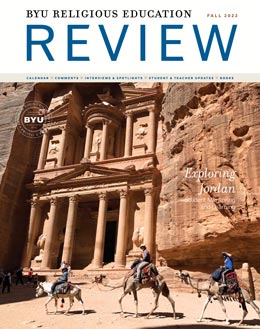New Assistant Academic Vice President Discusses Charge to Elevate and Align Religious Scholarship at BYU
An interview with Reid L. Neilson by Jared W. Ludlow
In August 2022 Reid L. Neilson returned to BYU to undertake a newly created position as assistant academic vice president for religious scholarly publications. Because this administrative change will directly affect Religious Education at BYU and its research and publishing endeavors, Jared W. Ludlow, publications director of the Religious Studies Center, sought occasion to learn more about Dr. Neilson’s appointment.
Ludlow: Welcome back to campus. Could you give us a little bit of your academic background and your career trajectory that started here at BYU and has now brought you back?
Neilson: Thanks for the warm welcome back to campus, Jared. This really has been a homecoming of sorts for me. I began my academic career here at BYU sixteen years ago when I started as an assistant professor of Church history and doctrine in fall 2006. I had just finished my PhD at the University of North Carolina at Chapel Hill earlier that spring and was so excited to be back in Provo, where I had taken my undergraduate degree in international relations and graduate degrees in business and history. As I began as a faculty member at BYU, I felt like I had won the lottery—to be in the company of scholars and administrators whom I admired greatly. After three years in Provo, I was recruited by Elder Marlin K. Jensen, then the Church Historian and Recorder, to leave BYU and move up to Salt Lake City to manage the Church History Department, which I did for the next decade. Then I was called to lead the Washington DC North Mission with my wife, Shelly, from 2019 until 2022. As I prepared to return to employment, I was invited by the Church Commissioner of Education to fill this newly created position here at BYU, which has brought me full circle to BYU. I’m very grateful for this new and exciting opportunity!
Ludlow: Since your position as the assistant academic vice president for religious scholarly publications is a new one, could you share with us what this position entails and how you are proceeding in it?
Neilson: In the past, the Neal A. Maxwell Institute for Religious Scholarship, the Religious Studies Center, and BYU Studies have all reported to different university administrators. While all three organizations have been successful in their own spheres and with their own reporting lines, there seems to have been a sense that there could be greater collaboration and synergy if all three organizations were able to operate more closely together under a shared administrative umbrella. I now have the good fortune to be working with the leadership and staffs of all three organizations. I think we can learn even more from each other as we counsel together and advance the university’s mission as a joint team. Right now I’m trying to learn all I can and am getting to know everyone I can to better understand the good that has been done and how we might move forward in meaningful directions.
Ludlow: What is your vision for religious scholarly publications and gospel scholarship here at BYU and within the Church?
Neilson: As I explored this new opportunity with Church and university leaders, two words were shared with me many times as I asked about what they hoped for the future of all three organizations. Those words were elevate and align. As I’ve reviewed my notes from those meetings, most of the discussions were centered on those two hopes and expectations. Of course, these admonitions should come as no surprise since we are all trying to personally and professionally elevate and align our lives and careers here at BYU to the gospel and Church of Jesus Christ. But there certainly was a sense communicated to me that we can and need to be better in building on past successes with our religious scholarship at BYU and also making any necessary adjustments to support and sustain the Brethren in their inspired initiatives. This is an exciting time to be involved in both scholarly publications and gospel scholarship, which are complementary.
Ludlow: Since you have published many religious scholarly publications yourself, what advice would you give for those who are doing or who would like to do research and writing in this area?
Neilson: I would encourage them to develop a passion for doing the hard work of religious scholarship while keeping in mind the blessings that come from that labor of love. Since I began at BYU sixteen years ago as a scholar, I have found great joy in research, writing, and publishing. When I am perusing old documents, drafting a paragraph, chasing down a footnote, or reviewing page proofs for a forthcoming article or book, my heart rejoices in a special way. I feel alive both spiritually and intellectually using the talents and interests the Lord has blessed me with. I’ll forever be grateful that BYU and the Church have provided me opportunities to both learn how to be a historian of religion, especially of the Latter-day Saint past, and to spend my professional life “enlarg[ing] the memory” (Alma 37:8) of my fellow Saints and extended family members.
